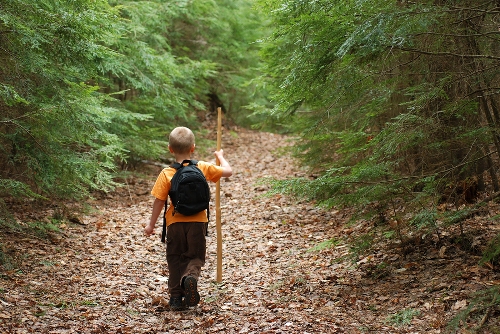Many parents and teachers today can remember hours spent in the great outdoors, called in only for dinner or when the last ray of summer light disappeared. Bookworm that I was, I can personally remember being told many days, “It’s a much too beautiful day to be inside. Go read that book in a tree!”
 Today, children’s lives seem to be structured much differently, a world where the phrase “Go play outside” has been replaced by television programs, computer time, and Wii Fit.
Today, children’s lives seem to be structured much differently, a world where the phrase “Go play outside” has been replaced by television programs, computer time, and Wii Fit.
Modern humans lived in nature for most of their long history. Even once colonization into cities occurred, people were surrounded by nature in the fields and farms where they lived.
And until thirty or so years ago, children still spent the bulk majority of their free time in contact with nature. Urbanization brought about parks and playgrounds to play in; fields, forests, and empty lots to explore; and even in nearby backyards. Children freely played, explored, and interacted with nature without restriction.
Today’s world is much different. Children no longer freely explore the world around them, and many have extremely limited contact with nature at all. Fear for safety, structured lessons and activities, and electronics are some of the main inhibitors to natural discovery that involve children today. Spontaneous interaction with nature is most often limited, at best.
Free play in nature encourages children to create games with their own invented rules, conduct experiments with nature, and learn lessons that aren’t “taught” by anyone. These types of “no rules” situations promote inventive play and give children a deeper understanding of nature.
While playground equipment is a perk of modern urbanization, its uses are more finite than those nature provides. Although equipment can be open-ended, imagined as a castle one day and a boat the next, nature is ever changing. Crossing a stream one day might become searching for treasures under river stones another day as the stream dries up. Tactile outdoor experiences teach children differently than a lesson or even reading about a subject can.
Besides the educational benefits, connecting with nature has more benefits than might be obvious. Research shows that children who are allowed to explore outdoors are socially and emotionally happier and healthier. Unstructured outdoor play is also touted as one of the most direct ways to combat childhood obesity, a very real and prominent problem for children. Vitamin D exposure from the sun is known to help prevent a host of diseases, as well as treat and prevent depression.
Richard Louv, author of Last Child in the Woods, has coined a phrase to sum up the current state of the modern child: nature deficit disorder. He believes that contact with nature can aid in preventing and treating Attention Deficit Hyperactivity Disorder (ADHD), and that children need regular contact with nature to stay physically and emotionally healthy. I highly recommend his book if you are interested in learning more about these ideas.
Outdoor play gives children the opportunity to value nature, and see it as an important part of of our world. This is a tangible way to ensure that we help them developing environmental stewards who will be both appreciative and respectful of nature as they grow.
Here are a few ideas for incorporating natural play into children’s everyday lives:
* Find a nature trail (or any place in nature, really) and encourage children to play, rather than just hike. Help children make up a game or collect bugs or leaves
* Allow children a small patch of land as “their own.” This can be in a backyard or a school yard. One school where I worked had a children’s garden in the strip of land that ran right next to the side of the school building. Let them use their imagination to dig, garden, build, etc.
* Invest in a few inexpensive outdoor exploration tools: bug box, magnifying glass, butterfly net, shovel, spade, and compass
* Rather than working indoors, take lessons outdoors. Learn about water cycles from the true source, use nature to teach about categorization, or compose a symphony of nature sounds. Even a language or math lesson is more fun when done outside on a beautiful day
Outdoor play gives children the opportunity to value nature, and see it as an important part of of our world. This is a tangible way to ensure that we help them developing environmental stewards who will be both appreciative and respectful of nature as they grow.

